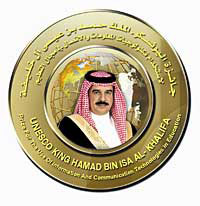Rector of Moscow Institute of Open Education and Jordan’s Ministry of Information and Communications Technology to receive 2009 UNESCO King Hamad Bin Isa Al-Khalifa Prize
París, 27 November

Irina Bokova, the Director-General of UNESCO, today designated the laureates of the 2009 UNESCO King Hamad Bin Isa Al-Khalifa Prize for the Use of Information and Communication Technologies (ICTs) in Education. They are Alexei Semenov, Rector of the Moscow Institute of Open Education, Russian Federation, and the Ministry of Information and Communications Technology of Jordan.
The winners of the Prize, focused this year on the theme “Teaching, Learning and e-Pedagogy: Teacher Professional Development for Knowledge Societies”, were selected on the recommendation of an international jury that met in Paris from 9 to 12 November. Honourable Mentions were also given to Thailand Cyber University (TCU) and to the Red de Profesores Innovadores (Network of Innovating Teachers) of the Fundación Chile.
Under the leadership of its Rector, Alexei Semenov, the Moscow Institute of Open Education has provided in-service training to about 30,000 teachers annually for the past 16 years. Professor Semenov has developed exemplary programmes to enable teachers to include ICTs in their work, as well as textbooks and teacher guides used widely in the Russian Federation and other countries. The recipient of numerous awards and a member of the Russian Academy of Sciences and Academy of Education, Professor Semenov actively promotes the central role of ICTs in educational policy and reform in the 21st century’s knowledge-driven societies.
The other winner is Jordan’s Ministry of Information and Communications Technology for its Jordan Education Initiative (JEI), launched in 2003. Through an innovative Public-Private Partnership (PPP), it trained over 3,000 teachers in ICT skills using six e-curricula as tools to enrich the national curriculum. The Ministry selected 100 public schools to test the innovations and provided them with the needed technical infrastructure. The programme disseminates best practices among teachers and encourages the creation of communities of practice.
The Director-General will present the Prize – a diploma and US$25,000 – to each of the two laureates at a ceremony on 26 January 2010 at UNESCO Headquarters. They were chosen from among 39 projects in 29 countries*. The Prize was launched in 2005 and is placed under the patronage of King Hamad Bin Isa Al Khalifa of the Kingdom of Bahrain.
Honourable Mentions will go to Thailand Cyber University (TCU) and to the Red de Profesores Innovadores (Network of Innovating Teachers) of the Fundación Chile. The TCU provides scalable e learning teacher training including preparation to use ICTs, collaborating in curricula development with seven educational technology departments at universities. More than 13,000 education professionals from 76 institutes have been trained. The Chilean network has established a portal to help teachers use ICTs and facilitate exchange of best practices. More than 20,000 teachers have been involved in the network so far.
*Austria, Azerbaijan, Chile, China, Czech Republic, Ethiopia, France, Georgia, Greece, India, Iran, Japan, Jordan, Kazakhstan, Kuwait, Lesotho, Malaysia, Malta, Namibia, Nigeria, Qatar, Romania, Russian Federation, Rwanda, Saudi Arabia, Serbia, Spain, Thailand and USA
- Author(s):UNESCOPRESS
- Source:Press release No. 2009-141
- 27-11-2009

